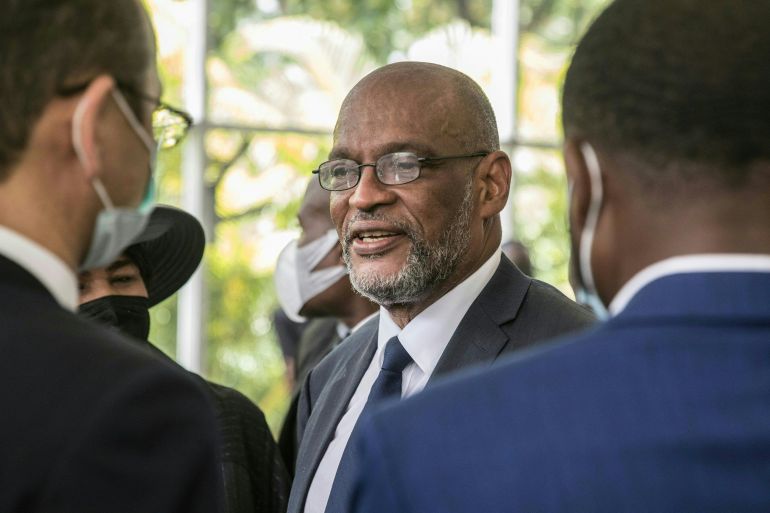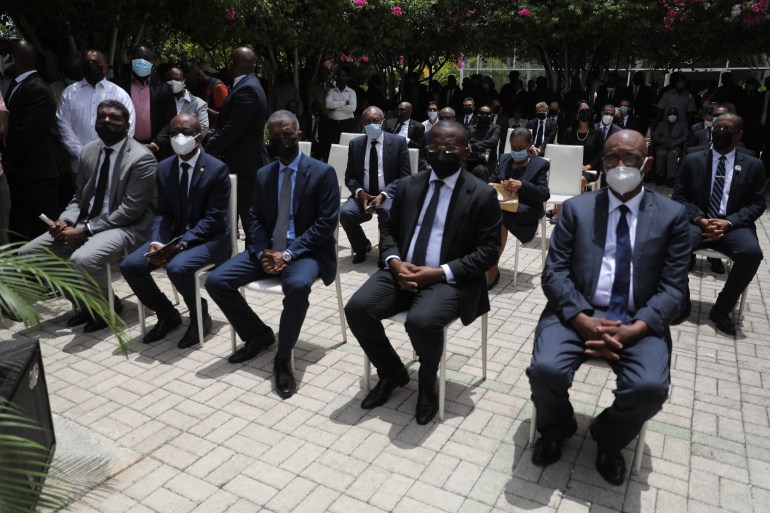Amid political crisis, Haiti appoints new prime minister
Ariel Henry’s swearing-in on Tuesday comes amid official commemorations for slain President Jovenel Moise.

Haiti has appointed a new prime minister, less than two weeks after President Jovenel Moise’s assassination threw the deeply divided Caribbean nation into greater political uncertainty.
Ariel Henry was sworn in during a ceremony in the capital Port-au-Prince on Tuesday, the same day that official commemorations were held to honour Moise.
Keep reading
list of 4 itemsWhat is really behind the crisis in Haiti?
Calls grow to stop US deportations to Haiti amid political crisis
Interim Haitian Prime Minister Claude Joseph to step down
The country’s acting Prime Minister Claude Joseph said earlier this week that he would step down “for the good of the nation” after a key group of international diplomats on Saturday came out in support of Henry and urged him to form a new government.
A 71-year-old neurosurgeon and former cabinet minister, Henry said during the ceremony that the plans to meet with various sectors of society in the coming days to build a political consensus to address the problems Haiti faces.
“It is in the context of extreme polarisation … that we must find and implement a lasting solution to the multifaceted crisis with which we are confronted,” he said.
Moise was killed on July 7 when a group of gunmen stormed his private residence in Port-au-Prince and opened fire on him and his wife, Martine Moise, who was critically injured.
The assassination has thrust Haiti, which has experienced mounting gang violence and political instability for years, into further disarray. Three political leaders had been vying for the Haitian leadership in the aftermath of Moise’s death, including Henry, who was chosen as prime minister by Moise just days before the president was killed.
Robert Fatton, a Haitian politics expert at the University of Virginia, said Joseph’s departure was to be expected. “Joseph’s fate was sealed over the weekend,” Fatton told The Associated Press. “Everything that happens in Haiti has a powerful foreign component.”
On Saturday, the Core Group called for the creation of “a consensual and inclusive government” in Haiti and said it “strongly encourages” Henry as the designated prime minister “to form such a government”.
The Core Group is composed of ambassadors from Germany, Brazil, Canada, Spain, the United States, France, the European Union and representatives from the United Nations and the Organization of American States.
Al Jazeera’s Andy Gallacher, reporting from Miami, said Henry’s swearing-in marks “an important step for the stability of Haiti”.
“I think it’s important to note that this will be an interim government. The whole point here is that Haiti heads towards democratic elections towards the end of the year,” he said.
“The elections must be seen as free and fair and there has to be someone that wins with a decent majority because stability is what this is all about,” Gallacher added.
However, a main opposition coalition known as the Democratic and Popular Sector called Henry a puppet of the international community and rejected his appointment. “This step is only a political provocation that will add fuel to the fire and push the country further into crisis,” it said.
Leading Haitian civil society activists also recently questioned a push by the United States, United Nations and other international actors for Haiti to hold general elections this year, saying a vote would not solve the crisis in a country where many key institutions are not functioning.
Moise had been governing by decree since last year, and he spurred a constitutional crisis and mass protests in February when he insisted that he had a year left on his presidential term – a position that was rejected by opposition groups, rights groups and leading jurists.

On Tuesday, the government released the names of Henry’s 18-member cabinet, with the ministers of justice, economy, finance, agriculture and others keeping their positions. Joseph will return to his former post as foreign minister.
In addition to running the government, Henry will serve as minister of social affairs and labour.
He had earlier promised to form a provisional consensus government to lead Haiti until elections are held. “We will need this unity to overcome the many challenges that beset us,” Henry said. “Some have observed the latest events with amazement, others wonder with reason about the management of the country.”
Henry also had said he met with various unidentified actors as well as civil society and the private sector. “I intend to continue and deepen these discussions, because it is the only way to bring the Haitian family together,” he said.
Meanwhile, many questions remain unanswered about Moise’s assassination, including the motive and who was ultimately behind it.
Haitian Police chief Leon Charles on Tuesday announced four more formal arrests, including at least three police officers, whose ranks he did not release. “There was infiltration in the police,” said Charles, without providing additional details.
The Haitian authorities have accused a gang of mercenaries of carrying out the killing. To date, 26 suspects – 18 Colombians, five Haitians and three Haitian-Americans – have been arrested.
Moise’s funeral will be held in the northern city of Cap-Haitien on Friday.